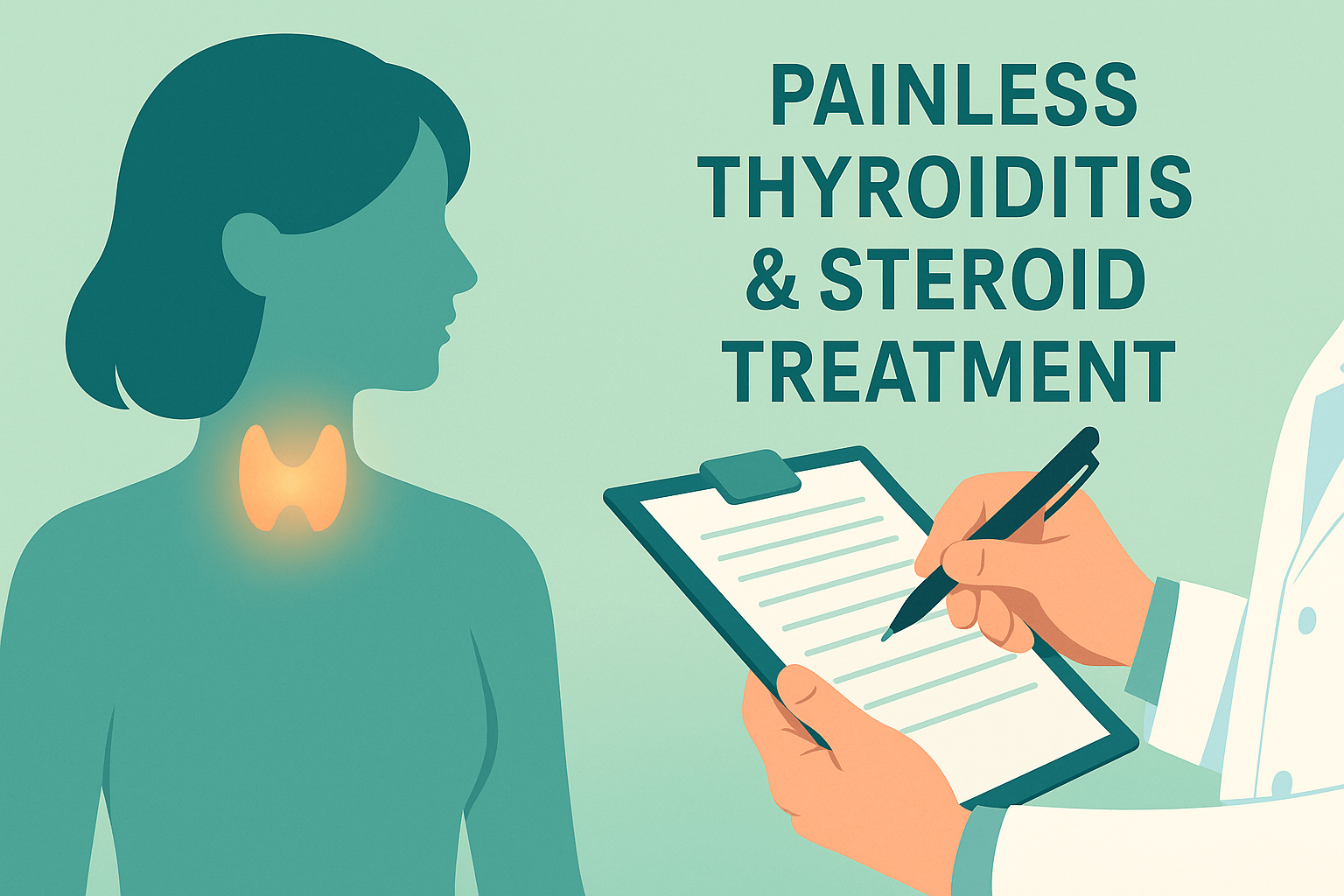・無痛性甲状腺炎は通常、ステロイド治療は必要ありません。
・例外的に圧迫感や強い症状がある場合に短期間のみ使用されることがあります。
・自己免疫疾患が背景にある場合は慎重な判断が求められます。
・しもやま内科では患者さんの状態を丁寧に見極めたうえで、必要最小限の治療を行っています。

はじめに
「無痛性甲状腺炎にステロイドは使うのでしょうか?」というご質問を患者さんから受けることがあります。この記事では、無痛性甲状腺炎の治療方針とステロイドを使う場合の例外的なケースについて、専門医の立場からわかりやすく解説します。
無痛性甲状腺炎とは?
無痛性甲状腺炎は、一時的に甲状腺ホルモンが多く分泌される「甲状腺中毒症状」を引き起こす疾患です。「無痛性」という名の通り、痛みを伴わないことが特徴で、自然に回復するケースがほとんどです。原因としては自己免疫が関与していると考えられています。
治療の基本方針
- 通常は経過観察のみ
- 甲状腺中毒症状(動悸・不安・疲労感など)がつらい場合にはβ遮断薬を用いる対症療法が行われます
- ステロイドは通常使用しません
ステロイドを使うケースはある?
はい、例外的なケースでは使用されることがあります。以下のような場合です:
1️⃣ 強い甲状腺腫大による圧迫症状がある場合
気道圧迫感や嚥下困難を伴うほどの腫大がある場合は、炎症性浮腫を抑えるためにステロイドが短期間使われることがあります。
2️⃣ 軽度の痛みや不快感がある場合
無痛性甲状腺炎は基本的に痛みを伴いませんが、亜急性甲状腺炎との鑑別が難しいケースで軽度の痛みがある場合に、症状緩和目的で使用されることがあります。
3️⃣ 甲状腺中毒症状が著明な場合
β遮断薬だけではコントロールできないほどの動悸・不眠・体重減少などが強い場合、炎症性の背景を抑える目的で短期間のステロイド使用が考慮されることがあります。
4️⃣ 自己免疫疾患が併存している場合
SLEや関節リウマチなどの自己免疫疾患の増悪に伴い発症しているケースでは、全身疾患の治療としてステロイドが併用されることがあります。
ステロイドを使う場合の実際の用量と期間
| ケース | 使用例 |
|---|---|
| 圧迫感が強い | プレドニゾロン 20〜30mg/日 → 数日間使用後速やかに漸減 |
| 軽度の痛み・不快感 | プレドニゾロン 10〜20mg/日 → 1〜2週間程度で終了 |
| 著明な甲状腺中毒症状 | プレドニゾロン 5〜10mg/日 → 数日〜1週間程度 |
| 自己免疫疾患の治療目的 | 併存疾患の方針に準拠 |
ステロイド治療の注意点
- ステロイドは長期使用する薬ではありません。必要最小限・短期間で終了するのが原則です。
- 不要なステロイド治療は副作用リスクがあるため、慎重な判断が求められます。
しもやま内科での診療方針
当院では、無痛性甲状腺炎に対しては基本的に経過観察を主体とした診療を行っています。ただし、患者さんの症状が強い場合や例外的な状況では、必要に応じて短期間のみステロイドを使用することがあります。
患者さん一人ひとりの状態を丁寧に見極め、最小限の治療で自然な回復をサポートすることを心がけています。ご不安な方はどうぞお気軽にご相談ください。
👨⚕️ この記事の監修医師
しもやま内科 院長
日本内科学会 総合内科専門医
日本糖尿病学会
よくあるご質問(FAQ)
糖尿病専門医・指導医
日本循環器学会 循環器専門医
日本老年医学会 老年病専門医・指導医
日本甲状腺学会 甲状腺専門医糖尿病、甲状腺、副腎など内分泌疾患の診療に長年従事し、地域密着型の総合内科医として診療を行っています。
特に甲状腺疾患の診療に力を入れており、無痛性甲状腺炎をはじめとする幅広い甲状腺疾患の診断と管理に取り組んでいます。
